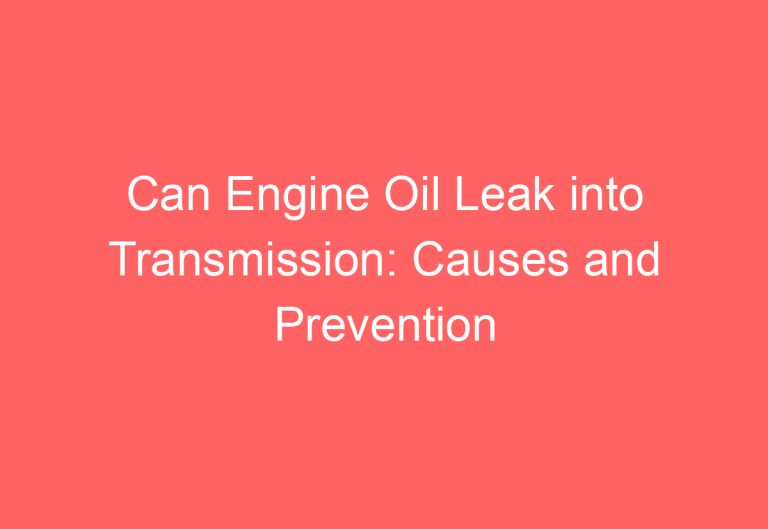Can Engine Oil Go Out of Date? Exploring the Shelf Life of Motor Oils
Engine oil is an essential component of any vehicle, and it plays a vital role in keeping the engine running smoothly. Many car owners are often unsure whether engine oil can go out of date or expire, and if so, how long it takes for oil to expire. The answer to this question is not straightforward, as engine oil can go bad for various reasons.

One reason why engine oil can go bad is due to its exposure to extreme temperatures. If the oil is exposed to high temperatures, it can break down and lose its lubricating properties, which can cause significant damage to the engine. Another reason why engine oil can go bad is due to its exposure to air, which can cause the oil to oxidize and become less effective over time.
Despite these factors, engine oil can last for a long time under optimal conditions. Most manufacturers recommend changing the oil every 5,000 to 7,500 miles, depending on the type of oil used and the driving conditions. However, it is essential to keep in mind that the lifespan of engine oil can vary depending on several factors, and it is crucial to pay attention to the oil’s color, texture, and smell to determine whether it needs to be changed.
Understanding Engine Oil and Its Shelf Life

Composition and Types of Engine Oil
Engine oil is a lubricant that is used to reduce friction between moving engine components. It is made up of a base oil and additives that enhance its performance. There are two main types of engine oil: conventional and synthetic. Conventional oil is made from crude oil, while synthetic oil is made from chemical compounds. Synthetic oil is known for its superior performance and longer lifespan.
Factors Affecting Engine Oil Shelf Life
The shelf life of engine oil depends on several factors, including the type of oil, the additives used, and how it is stored. Synthetic oils typically have a longer shelf life than conventional oils. The shelf life of motor oil is usually indicated on the label of the container. It is recommended that fresh oil be used for optimal engine performance. Exposure to air, heat, and moisture can cause oxidation and contamination of the oil, which can shorten its lifespan.
Identifying Signs of Engine Oil Deterioration
It is important to know when engine oil has deteriorated and needs to be replaced. Signs of deteriorated oil include a change in color, a burnt smell, and a change in viscosity. Contamination of the oil can also occur due to dirt and debris in the engine. Lubrication of the engine components can be compromised if the oil is not changed regularly. It is not safe to use expired motor oil, as it can cause damage to the engine and increase oil consumption.
Overall, it is important to understand the composition and types of engine oil, the factors affecting its shelf life, and how to identify signs of deterioration. Proper storage and regular oil changes can help to maintain the quality of the lubricant and ensure optimal engine performance.
Best Practices for Storage and Usage

Proper Storage Conditions for Engine Oil
To ensure the longevity and efficiency of engine oil, it is crucial to store it properly. Engine oil should be kept in a dry location with consistent temperatures between 60 and 80 degrees Fahrenheit. Exposure to extreme temperatures, direct sunlight, and humidity can lead to water contamination, deterioration, and sludge formation.
It is also recommended to store engine oil in its original container to prevent exposure to impurities and dirt. If an opened bottle of engine oil is not used within a year, it is best to dispose of it and purchase a new one.
When to Change Engine Oil
Engine oil should be changed regularly to maintain the performance and longevity of the engine. The frequency of oil changes depends on various factors such as the type of oil used, driving conditions, and the age of the vehicle.
As a general rule, conventional engine oil should be changed every 3,000 to 5,000 miles, while synthetic oil can last up to 10,000 miles. However, it is important to follow the manufacturer’s recommendations for oil changes and to check the oil level regularly using the dipstick.
Disposing of Expired Engine Oil
Engine oil expires and loses its chemical properties over time. It is crucial to dispose of expired engine oil properly to prevent environmental contamination and damage.
Expired engine oil can be identified by its darkened color, sludge formation, and unpleasant odor. It is recommended to check the expiration date printed on the bottle and dispose of the oil if it has exceeded its shelf life.
To dispose of engine oil, it is best to take it to a recycling center or a licensed disposal facility. Pouring engine oil down the drain or in the trash can lead to environmental pollution and contamination.
Overall, following these best practices for storage and usage can help maintain the efficiency and longevity of engine oil.
Frequently Asked Questions

Is there an expiration date for unopened motor oil?
Yes, there is an expiration date for unopened motor oil. The typical shelf life of conventional oil is around five years, while synthetic and synthetic blend oils can last between seven and eight years. However, it’s important to note that the expiration date is only an estimate, and motor oil can go bad even if it’s never been used.
How does opening engine oil affect its shelf life?
Opening engine oil can affect its shelf life, as it exposes the oil to air, moisture, and other contaminants. Once opened, the oil’s effectiveness can begin to degrade, and it may not perform as well as it should. To maximize the shelf life of opened engine oil, it should be stored in a tightly sealed container and kept in a cool, dry place.
What is the shelf life of synthetic motor oil?
The shelf life of synthetic motor oil is generally longer than that of conventional oil, with an estimated lifespan of seven to eight years. However, like conventional oil, synthetic oil can still go bad if it’s exposed to air, moisture, or other contaminants.
Can engine oil become unusable in a car that is rarely driven?
Yes, engine oil can become unusable in a car that is rarely driven. When a car sits for long periods of time, the oil can break down and lose its effectiveness, even if it’s never been used. This is because the oil can be exposed to air, moisture, and other contaminants, which can cause it to degrade over time.
What are the consequences of using engine oil past its prime?
Using engine oil past its prime can have several consequences. The oil may not lubricate the engine as well as it should, which can cause increased wear and tear on engine components. It may also cause the engine to run less efficiently, which can lead to decreased fuel economy and increased emissions.
Is decade-old engine oil still safe to use in a vehicle?
No, decade-old engine oil is not safe to use in a vehicle. Even if the oil has never been used, it can still break down and lose its effectiveness over time. Using old engine oil can cause damage to the engine and decrease its lifespan. It’s important to always use fresh, high-quality engine oil to keep your car running smoothly.






